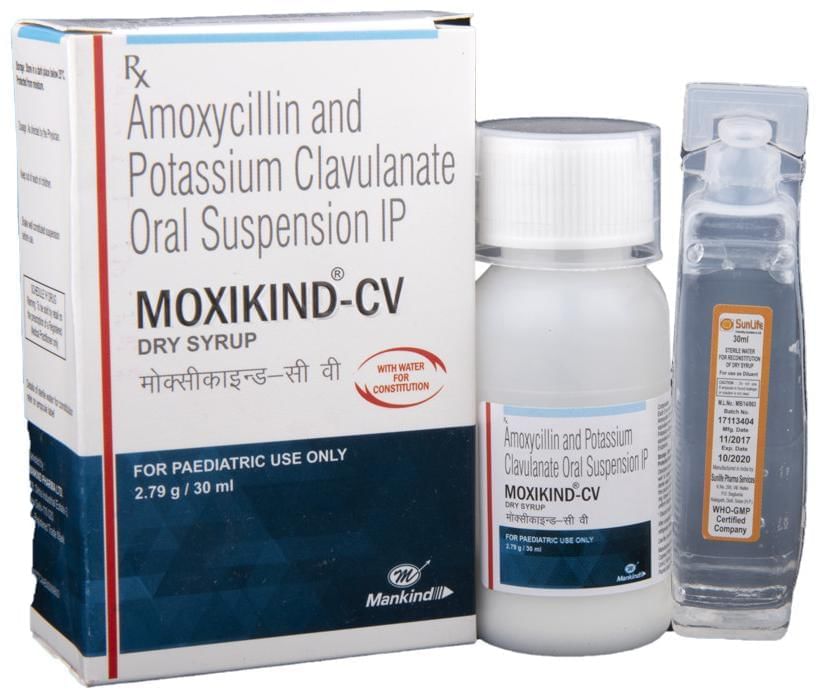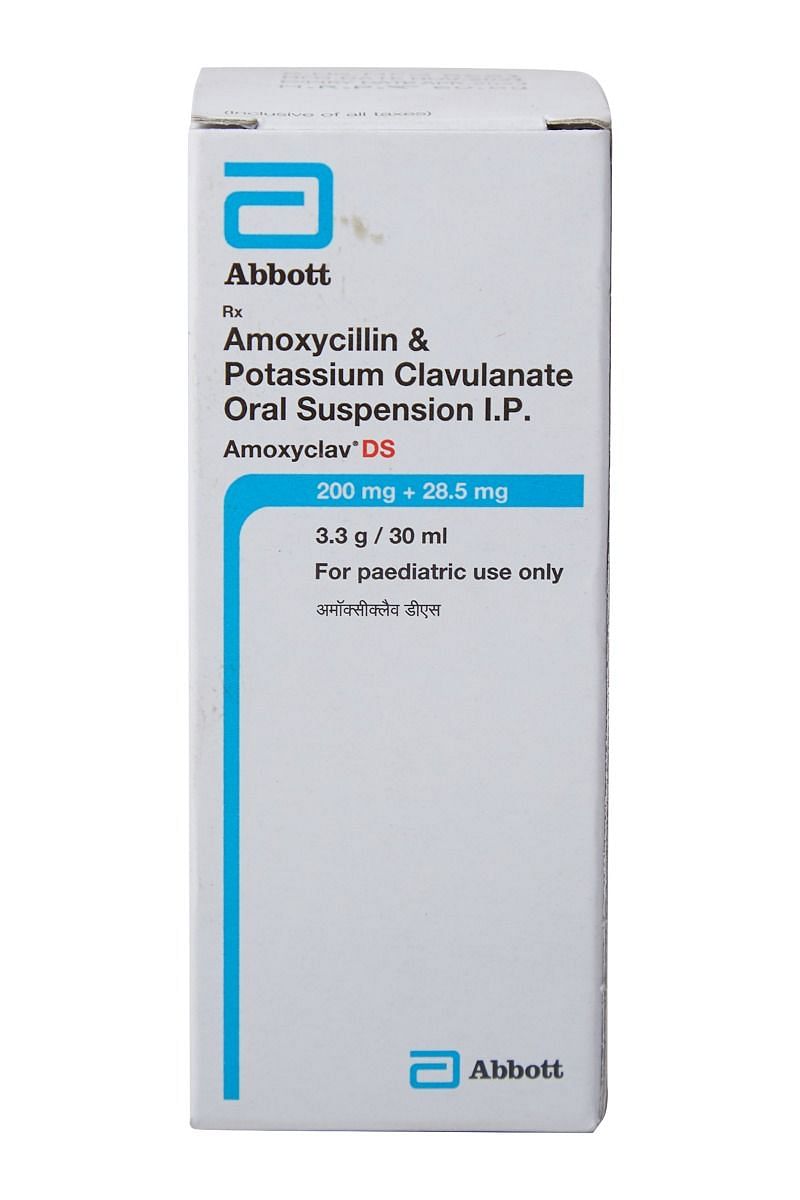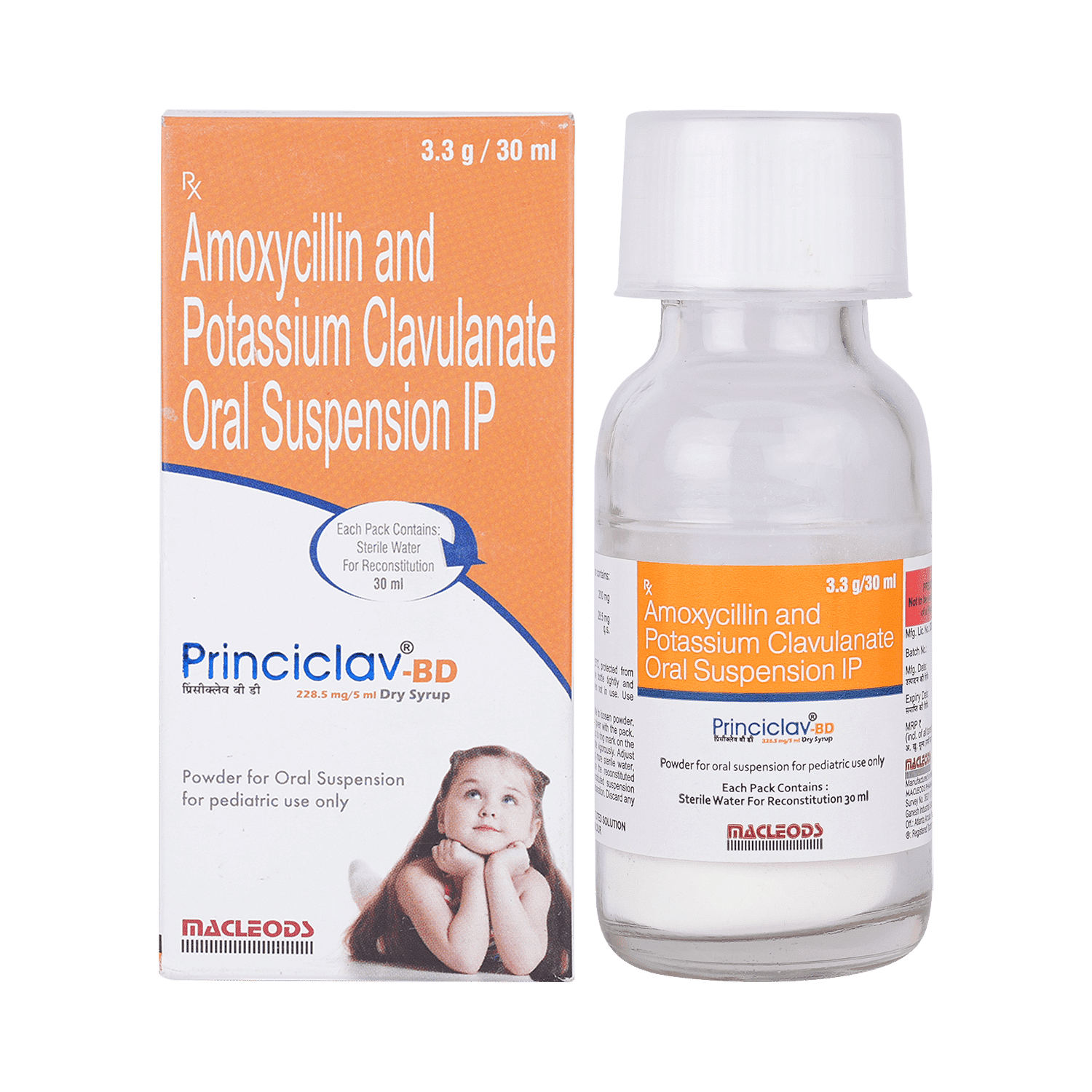
Mokcan CV 200mg/28.5mg Dry Syrup
Manufacturer
Cadila Pharmaceuticals Ltd
Salt Composition
Amoxycillin (200mg) + Clavulanic Acid (28.5mg)
Key Information
Short Description
Mokcan CV 200mg/28.5mg Dry Syrup is an antibiotic medicine that helps treat bacterial infections of the ear, nose, throat, chest, lungs, teeth, skin, and urinary tract.
Dosage Form
Dry Syrup
Introduction
Mokcan CV 200mg/28.5mg Dry Syrup is an antibiotic medicine that helps treat bacterial infections of the ear, nose, throat, chest, lungs, teeth, skin, and urinary tract. It is capable of killing bacteria that have become resistant to other therapies and thus also helps treat tuberculosis that is resistant to other treatments.
Directions for Use
Never give Mokcan CV 200mg/28.5mg Dry Syrup until and unless prescribed by the doctor. You must also never share your child’s medicine with anyone else even if they show similar symptoms.
Safety Information
Side Effects
No common side effects listed.
How it works
Mokcan CV 200mg/28.5mg Dry Syrup is an antibiotic. It has two active agents amoxycillin and clavulanic acid. Amoxycillin works by preventing the formation of the bacterial protective covering (cell wall) essential for the survival of the bacteria. Whereas clavulanic acid serves a special purpose of inhibiting an enzyme (beta-lactamase) that is produced by resistant bacteria.
Quick Tips
Your child must complete the entire course of antibiotics. Stopping too soon may cause the bacteria to multiply again or cause another infection. Your child may have a bitter taste in the mouth after the intake of Mokcan CV 200mg/28.5mg Dry Syrup. Eating citrus fruit or sipping plenty of water or fruit juice may help. Encourage your child to drink plenty of water in case diarrhea develops as a side effect. Never give Mokcan CV 200mg/28.5mg Dry Syrup until and unless prescribed by the doctor. Do not give Mokcan CV 200mg/28.5mg Dry Syrup to treat common cold and flu-like symptoms caused by viruses.
Related Medicines

Moxikind-CV Dry Syrup

Advent 228.5mg Dry Syrup Tangy Orange

Amoxyclav Dry Syrup

Princiclav -BD Dry Syrup

Alnos CV Dry Syrup

Dentoclav 200mg/28.5mg Dry Syrup

Moxiphar-CV Dry Syrup

Moxit CV Dry Syrup

Moxylik Dry Syrup

Amcv Dry Syrup
Frequently asked questions
Can other medicines be given at the same time as Mokcan CV 200mg/28.5mg Dry Syrup?
Mokcan CV 200mg/28.5mg Dry Syrup may interact with other medications or substances. It's important to tell your child's doctor about all other medications they are taking before starting Mokcan CV 200mg/28.5mg Dry Syrup. Always consult with your child's healthcare provider before administering any medication to your child.
Can I get my child vaccinated while on treatment with Mokcan CV 200mg/28.5mg Dry Syrup?
Antibiotics generally do not interfere with the ingredients in vaccines or cause a negative reaction in children recently vaccinated. However, it's important to ensure your child recovers from any illness before vaccination and follow your doctor's guidance.
Which lab tests may my child undergo while taking Mokcan CV 200mg/28.5mg Dry Syrup on a long-term basis?
Periodic kidney and liver function tests might be recommended during prolonged treatment to monitor your child's overall health.
Can I give a higher than the recommended dose of Mokcan CV 200mg/28.5mg Dry Syrup to my child?
Giving a higher dose of this medication may increase potential side effects. If your child experiences increased symptoms, please consult your doctor for re-evaluation.
Can I stop giving Mokcan CV 200mg/28.5mg Dry Syrup to my child when the symptoms are relieved?
No, you should not stop administering this medication unless the entire treatment course is completed, even if your child's symptoms improve. The infection may still be actively being treated, and continuing the medication ensures optimal results.
Can the use of Mokcan CV 200mg/28.5mg Dry Syrup cause diarrhea?
Yes, Mokcan CV 200mg/28.5mg Dry Syrup can sometimes cause diarrhea. This is due to its antibiotic properties, which kill harmful bacteria in your child's system. Additionally, this medication may affect the good bacteria in your child's gut, leading to diarrhea. If diarrhea occurs, encourage your child to drink plenty of water or other fluids. Seek immediate medical attention if diarrhea persists and you observe signs of dehydration such as less frequent urination with dark-colored and strong-smelling urine. Do not give any other medicine to your child without consulting a doctor.
Do all viral common colds result in secondary bacterial infection?
Most viral infections do not lead to secondary bacterial infection. In fact, antibiotics are generally not needed for viral infections and can sometimes increase the risk of side effects. Always consult your child's doctor before starting antibiotic medication.
The mucus coming out of my child’s nose is yellow-green. Is it a sign of a bacterial infection?
Yellow or green mucus in the nose does not necessarily indicate a bacterial infection and is a normal response to viral infections, especially during a cold. It's common for mucus to thicken up and change color from clear to yellow or green.
Is there any sign which shows that my child needs immediate medical attention?
In case of serious allergic reactions (difficulty breathing, skin rashes), gastrointestinal infections (diarrhea), or liver damage (weakness, paleness, vomiting), you must contact your child's doctor immediately. Though rare, these symptoms are significant and require professional intervention.


